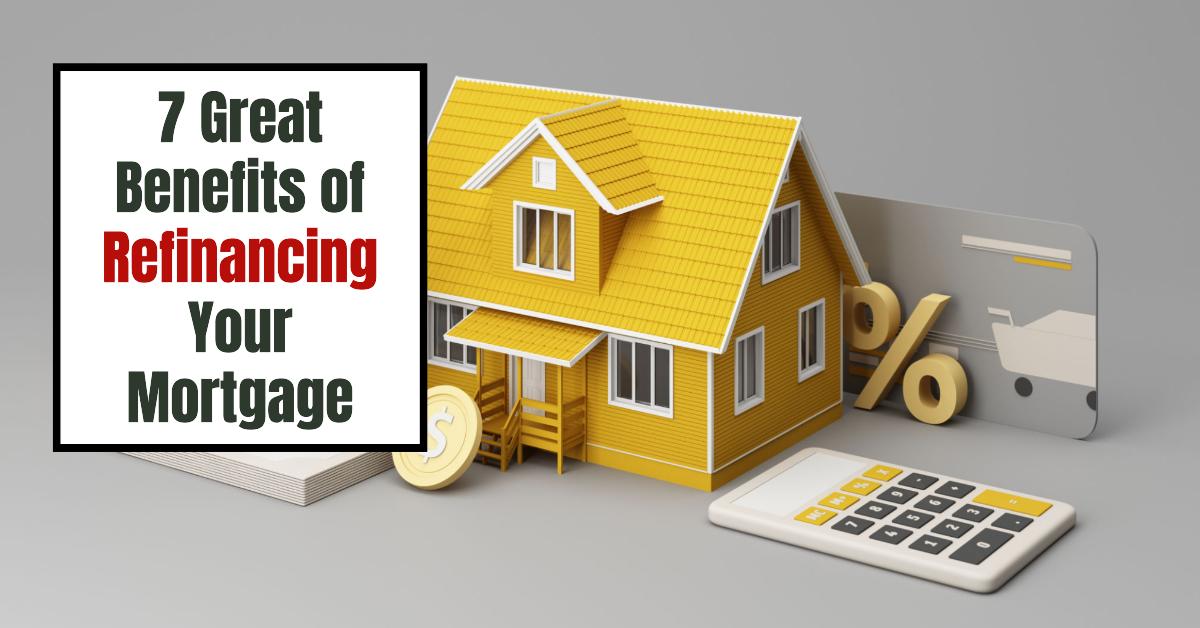Exchanging your old mortgage with a new one at a new interest rate is known as Refinancing your Mortgage. The number one benefit of refinancing your mortgage is to obtain a loan at a lower rate of interest and also to decrease the monthly mortgage payment amount. One of the benefits of refinancing your mortgage is also that refinancing provides the borrower with fresh money at lower interest rates due to which the homeowner can lower his/her monthly payment amount.
Most individuals take out loans for financing their studies, homes, vehicles, etc., and added to this; they also accumulate loans on credit cards. On average, most households spend almost half or more of their earnings towards loan repayment and the escalating rates of interest to ensure that the term of repayment keeps on growing.
7 Benefits of Refinancing Your Mortgage
Refinancing a mortgage not only reduces interest rates and the monthly installment amount, but it leaves the homeowner with enough for either investing in another property or renovating their home. Let us discuss the 7 benefits of refinancing your mortgage.
Benefit# 1: Lower Rate of Interest Than the Existing Rate
One of the benefits of refinancing your mortgage is that you can use it to lower the rate of interest. Reducing the interest rates and bringing down the overall mortgage amount saves money for the homeowner. Even a 1% reduction in interest rate brings down the mortgage rate drastically.
However, there is one caveat, that if the refinanced loan has the same interest rate as previously, but a longer term, it will result in a larger total interest cost over the life of the loan, and will result in the borrower remaining in debt for many more years. Typically, a refinanced mortgage will have a lower interest rate. Therefore, you should take note of this.
Benefit# 2: Decrease in The Loan Term
Another advantage of refinancing your mortgage is that the decrease in the interest rates allows homeowners to replace an existing loan with another with the added benefit of a shorter loan term and no change in the payment amount.
Benefit# 3: Switching Between Adjustable And Fixed Rate Of Interest
There is no change in the Fixed Rate of interest over the entire loan repayment term whereas the Adjustable Rate of Interest keeps fluctuating. Usually, the Adjustable Rate starts with a lower rate as compared to the Fixed during the initial days when the loan is taken but increases over a period.
Benefit# 4: Consolidating Debt Through Refinancing Your Mortgage

Consolidation of debt is the reason most homeowners refinance their mortgages. It is one of the biggest benefits of refinancing your mortgage. Replacing all the other debts with one mortgage loan sounds like a better option for most homeowners, and also leaves them with enough at hand to remodel their house.
However, it is not always a sound option to consolidate the debt. The reasons are as follows:
- Refinancing your mortgage requires fresh processing of the loan which means refilling all the paperwork.
- Verification of loan applicant details which includes bank statements, credit history, assets, etc., though in some cases, it is bypassed.
According to Wikipedia, if the replacement of debt occurs under financial distress, refinancing might be referred to as debt restructuring.
Benefit# 5: Refinancing Your Mortgage Can Give You Some Excess Funds
One of the benefits of refinancing your mortgage is that it can give you some excess cash in hand. The homeowner can opt for reinvesting the excess funds towards the purchase of another property or towards renovating the home after refinancing the loan. Reinvesting funds towards future security is also an option that the homeowner can look into. Therefore, the excess cash in hand can be used for renovating your home or reinvesting and multiplying your wealth through other modes of investments.
Benefit# 6: Improvement in Monthly Cash Flow
Refinancing usually means that there is an improvement in the monthly cash flow of the homeowner. As he/she obtains the loan at a lower rate of interest and consolidates all the debts, he/she now has to pay only one loan amount, which is obtained at a lower rate of interest and is left with some cash in hand. Therefore, it can also be considered as one of the benefits of refinancing your mortgage.
Benefit# 7: Eliminating Your Private Mortgage Insurance
If your home has increased in value since you took out your mortgage or refinanced your mortgage, it is possible you can eliminate PMI from your payment. For private mortgage insurance, you must have at least 20 percent equity in the home. You may ask the lender to cancel PMI when you have paid down the mortgage balance to 80 percent of the home's original appraised value.
When Should You Refinance Your Mortgage?

Even when there is a chance of saving 1% from the existing rate of interest, it is ideal to refinance your mortgage. This is because it brings down the overall rate of interest. Converting an Adjustable Rate of interest to a Fixed Rate of Interest or vice versa can also be a reason to refinance your mortgage.
Types of Refinancing
- Rate and Term Refinancing: Wherein the balance loan amount is refinanced with an affordable rate of interest and lower term
- Cash-out Refinancing: Wherein a higher amount of mortgage is taken than the actual repayment amount, and the difference amount is used for repaying another debt
- Cash-In Refinancing: Wherein the homeowner brings in the required amount of cash and closes the loan or reduces the repayment amount
Refinancing Your Mortgage: To Do Or Not To Do
The bottom line is that Refinancing of Mortgage lowers mortgage payments, reduces the loan term, and also consolidates debt. It is a great financial move if it is planned and executed carefully. You will not only get your debt under control but will also be able to repay it quickly and will be left with some cash in hand. If you're searching for mortgage options, you will probably find out that there are many types of mortgage loans available to choose from. Click on the link to learn about 4 types of real estate investment loans that can availed for financing investment properties.



